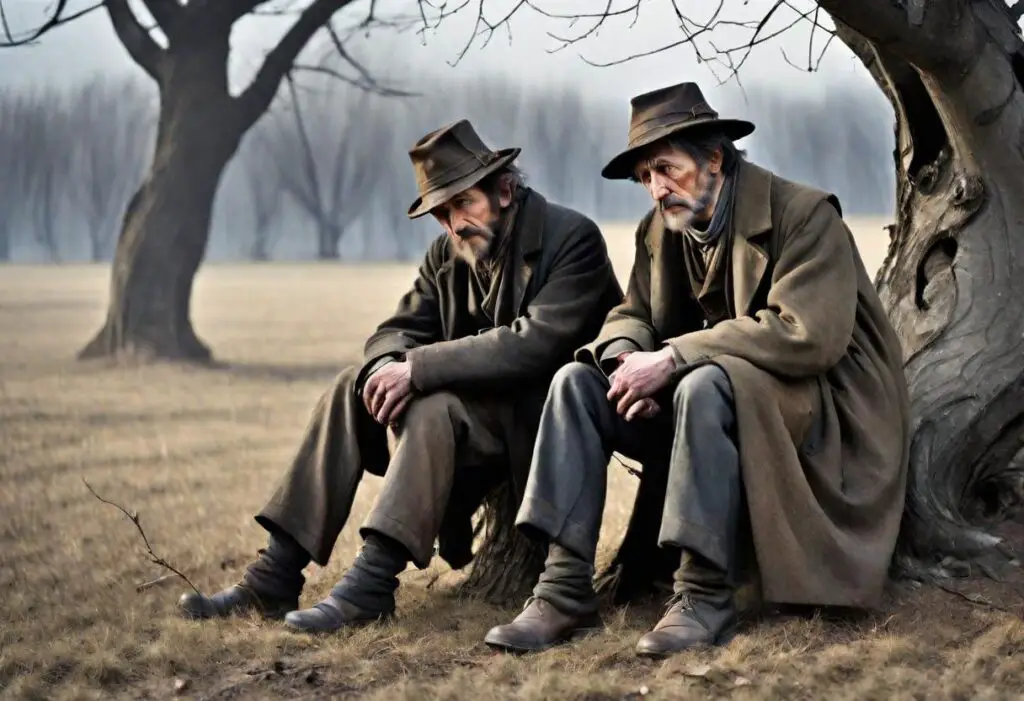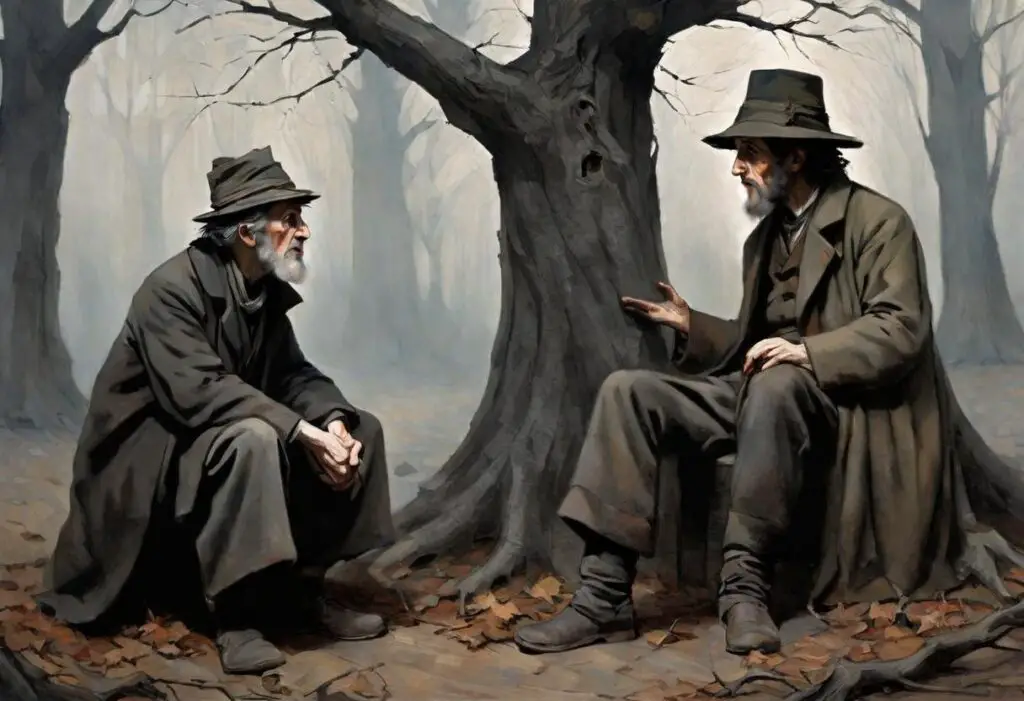Two men, Vladimir and Estragon, are waiting by a tree. They talk, they argue, they laugh, and they cry. They keep looking down the road, hoping for someone named Godot to arrive. The night comes, but Godot never shows up. They decide to leave but remain, unable to move, still waiting. Waiting for Godot By Samuel Beckett
Introduction of Waiting for Godot By Samuel Backet:
“Waiting for Godot” is a play written by Samuel Beckett. It was first published in 1952 and was originally written in French. Beckett later translated the play into English himself. Samuel Beckett was an Irish playwright and novelist. This play is known for its absurdity and deep philosophical themes. It is about two characters, Vladimir and Estragon, who wait for someone named Godot. They do not know much about him, but they believe he will change their lives.
Major Characters in Waiting for Godot By Samuel Backet:
Vladimir (Didi): One of the main characters waiting for Godot.
Estragon (Gogo): The other main character waiting for Godot.
Pozzo: A pompous man who passes by and interacts with Vladimir and Estragon.
Lucky: Pozzo’s servant, who is mistreated by Pozzo.
Boy: A messenger from Godot who informs Vladimir and Estragon that Godot will not come today but will surely come tomorrow.
Summary of “Waiting for Godot” by Samuel Beckett:
Vladimir and Estragon are two men waiting by a tree for someone named Godot. They are not sure why they are waiting, but they feel they must. As they wait, they engage in various conversations and activities to pass the time. They discuss many things, such as the Bible, dreams, and life. They often contemplate leaving but decide to stay and wait for Godot.

As they wait, Pozzo and Lucky pass by. Pozzo is on his way to sell Lucky, his servant. Pozzo treats Lucky very poorly, commanding him to do tricks and speak. Lucky’s speech is a long, nonsensical monologue that confuses everyone. After Pozzo and Lucky leave, a boy arrives. He tells Vladimir and Estragon that Godot will not come today but will come tomorrow. The boy leaves, and night falls. Vladimir and Estragon decide to leave but remain, still waiting.
The next day, Vladimir and Estragon are still waiting by the tree. They again engage in various conversations and activities. Pozzo and Lucky pass by again, but this time, Pozzo is blind, and Lucky is mute. Pozzo does not remember meeting Vladimir and Estragon the previous day. After they leave, the boy arrives again with the same message: Godot will not come today but will come tomorrow. Once again, night falls, and Vladimir and Estragon decide to leave but remain, still waiting.

Themes of “Waiting for Godot” by Samuel Beckett
The Absurdity of Life:
The play explores the idea that life is inherently meaningless and absurd. Vladimir and Estragon wait for Godot without knowing why, representing the human condition of searching for meaning in a meaningless world.
The Passage of Time:
Time is a central theme in the play. Vladimir and Estragon constantly struggle to pass the time while waiting. Their repetitive actions and conversations highlight the monotonous and cyclical nature of time.
Hope and Despair:
Despite the absurdity and uncertainty, Vladimir and Estragon continue to hope that Godot will come. This hope keeps them going, even though it also leads to despair when Godot does not arrive.
The Human Condition:
The play examines the human condition through the interactions between the characters. It explores themes of friendship, suffering, and the search for meaning. Vladimir and Estragon’s relationship highlights the need for companionship and the shared human experience.
Major Character Analysis:
Vladimir (Didi)
Vladimir is one of the main characters waiting for Godot. He is more intellectual and philosophical compared to Estragon. He often contemplates the meaning of their wait and tries to find a purpose. Vladimir takes on a more caring and protective role, looking after Estragon and trying to keep their spirits up.
Estragon (Gogo)
Estragon is the other main character waiting for Godot. He is more physical and emotional than Vladimir. Estragon often complains about his physical discomfort and relies on Vladimir for support. Despite his frequent complaints, Estragon is deeply attached to Vladimir and depends on him for companionship.
Pozzo
Pozzo is a pompous man who passes by Vladimir and Estragon. He is authoritative and treats his servant, Lucky, very poorly. Pozzo represents the theme of power and control. In the second act, Pozzo becomes blind, symbolizing the loss of control and the unpredictable nature of life.
Lucky
Lucky is Pozzo’s servant who is mistreated and commanded to perform tricks. Despite his poor treatment, Lucky remains loyal to Pozzo. His long, nonsensical monologue highlights the theme of the absurdity of life. In the second act, Lucky becomes mute, representing the loss of communication and the further absurdity of existence.
Boy
The boy is a messenger from Godot who informs Vladimir and Estragon that Godot will not come today but will surely come tomorrow. The boy represents the hope that keeps Vladimir and Estragon waiting. Despite the repeated disappointments, the boy’s message keeps their hope alive.
Critical View:
“Waiting for Godot” by Samuel Beckett is one of the best plays of the 20th century. It is a key example of the Theatre of the Absurd, which shows how life can feel pointless and strange. The play uses a simple setting and repeated dialogue to highlight the boring and endless nature of life.
Critics love the play for its deep thoughts and look into human life. The characters talk and wait for Godot, showing how people search for meaning in a world that seems meaningless further the play’s unclear ending lets people think about it in different ways, making it a timeless and thought-provoking piece.
Conclusion:
“Waiting for Godot” by Samuel Beckett is a profound and thought-provoking play that explores the absurdity of life, the passage of time, and the human condition.
Through the characters of Vladimir and Estragon, the play highlights the themes of hope and despair, companionship, and the search for meaning.
Despite its simple setting and repetitive dialogue, the play’s deep philosophical themes and exploration of the human experience make it a timeless masterpiece. As Vladimir and Estragon continue to wait for Godot, the play leaves us questioning the meaning of our existence and the nature of our hopes and dreams.
